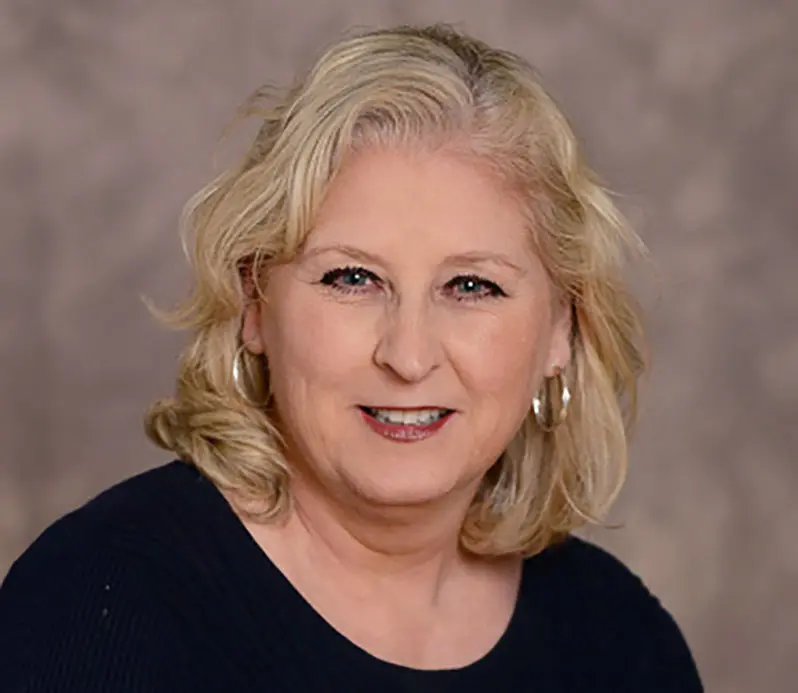Obtain certification and advance your career in clinical chemistry with our specialized credential.
Performs analyses on blood and body fluids to determine the presence or quantity of chemical and/or hormonal content in the specimens to aid in the prevention, diagnosis, and treatment of diseases. Specialists have advanced knowledge, skills, and abilities; they serve as leaders, educators, and advisors within their specialty area.
Attaining an American Society for Clinical Pathology Board of Certification (ASCP BOC) credential requires a laboratory professional or other expert to meet specific education, training, and/or experience standards and to successfully pass an examination demonstrating knowledge and applied skills. The ASCP BOC offers ASCP and ASCPi credentials based on distinct eligibility requirements. All candidates must carefully compare credentialing options. Additional information is available about the similarities and differences between ASCP and ASCPi credentials.
Each credential has specific eligibility requirements, which are different for ASCP and ASCPi. It’s your responsibility to confirm that your education, training, and/or experience meet the criteria. Submit the correct documentation with your application. Once submitted, the category and route of application cannot be changed.
Check Your EligibilityAn applicant must be able to verify that they meet all eligibility requirements, including education, training, and/or experience. For complete information, see the Documentation section of the website.
Education does not need to be from the United States. Details are available by reviewing the webpage titled Acceptable Education, also available in the routes below.
To be eligible for this examination category, an applicant must satisfy the minimum requirements (for degrees, the stated degree or higher) of at least one of the following routes:
An applicant must be able to verify that they meet all eligibility requirements, including education, training, and/or experience. For complete information, see the Documentation section of the website.
Education needs to be equivalent to education from the United States. Details are available by reviewing the webpage titled Acceptable Education, also available in the routes below.
To be eligible for this examination category, an applicant must satisfy the minimum requirements (for degrees, the stated degree or higher) of at least one of the following routes:
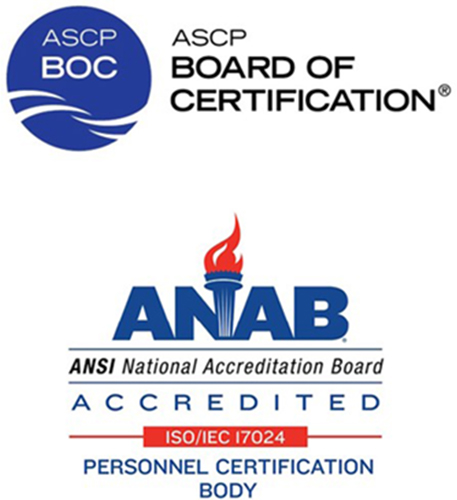
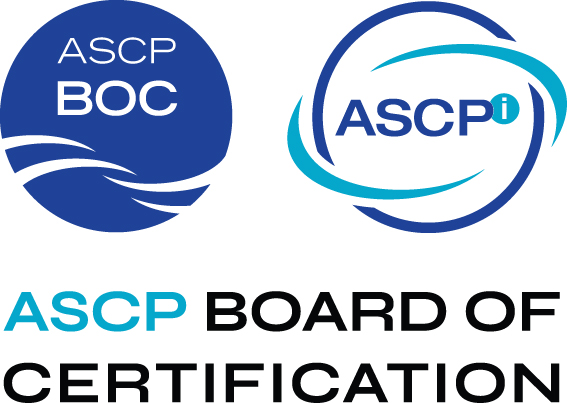
Valid MLS(ASCP) or C(ASCP) certification,
AND a baccalaureate degree from an accredited (regionally or nationally) college/university,
AND 3 years of full-time acceptable clinical* experience in chemistry in an acceptable laboratory within the last 6 years. These 3 years of experience must be acquired post-baccalaureate degree and must be documented on this Experience Documentation Form.
*Acceptable Clinical Laboratory:
CMS CLIA certificate of registration, compliance, accreditation;
OR DoD CLIP certificate of registration, compliance, accreditation;
OR JCI accreditation;
OR Accreditation under ISO 15189.
Experience
To fulfill the experience requirement for the Specialist in Chemistry examination, you must have laboratory or teaching experience, within the time frame required, in 8 of the 15 procedures listed:
Laboratory or teaching experience is also required in 2 of the 6 areas listed:
Master’s degree from an accredited (regionally or nationally) college/university in chemistry, biology, immunology, microbiology, allied health, medical laboratory science, or an appropriately related field,
AND 3 years of full-time acceptable clinical* experience in chemistry in an acceptable laboratory within the last 6 years. These 3 years of experience must be acquired post-baccalaureate degree and must be documented on this Experience Documentation Form.
*Acceptable Clinical Laboratory:
CMS CLIA certificate of registration, compliance, accreditation;
OR DoD CLIP certificate of registration, compliance, accreditation;
OR JCI accreditation;
OR Accreditation under ISO 15189.
Experience
To fulfill the experience requirement for the Specialist in Chemistry examination, you must have laboratory or teaching experience, within the time frame required, in 8 of the 15 procedures listed:
Laboratory or teaching experience is also required in 2 of the 6 areas listed:
Doctorate from an accredited (regionally or nationally) college/university in chemistry, biology, immunology, microbiology, allied health, medical laboratory science, or an appropriately related field,
AND 2 years of post-doctoral fellowship% in clinical* chemistry in the U.S. or Canada OR 2 years of full-time acceptable clinical* experience in chemistry in an acceptable laboratory within the last 5 years. These 2 years of experience must be acquired post-baccalaureate degree and must be documented on this Experience Documentation Form.
*Acceptable Clinical Laboratory:
CMS CLIA certificate of registration, compliance, accreditation;
OR DoD CLIP certificate of registration, compliance, accreditation;
OR JCI accreditation;
OR Accreditation under ISO 15189.
%A copy of the certificate of completion of the post-doctoral fellowship is required.
Experience
To fulfill the experience requirement for the Specialist in Chemistry examination, you must have laboratory or teaching experience, within the time frame required, in 8 of the 15 procedures listed:
Laboratory or teaching experience is also required in 2 of the 6 areas listed:
Valid MLS(ASCP) or C(ASCP) certification,
AND a Doctorate from an accredited (regionally or nationally) college/university in chemistry, biology, immunology, microbiology, allied health, medical laboratory science, or an appropriately related field,
AND 1 year of full-time acceptable clinical* experience in chemistry in an acceptable laboratory within the last 5 years OR 1 year of full-time acceptable research experience in chemistry in the U.S. or Canada within the last 5 years. This year of experience must be acquired post-baccalaureate degree and must be documented on this Experience Documentation Form.
*Acceptable Clinical Laboratory:
CMS CLIA certificate of registration, compliance, accreditation;
OR DoD CLIP certificate of registration, compliance, accreditation;
OR JCI accreditation;
OR Accreditation under ISO 15189.
Experience
To fulfill the experience requirement for the Specialist in Chemistry examination, you must have laboratory or teaching experience, within the time frame required, in 8 of the 15 procedures listed:
Laboratory or teaching experience is also required in 2 of the 6 areas listed:
Valid MLS(ASCP) or C(ASCP) certification,
AND a baccalaureate degree from an accredited (regionally or nationally) college/university,
AND 3 years of full-time acceptable experience as an academic educator in clinical chemistry at an accredited (regionally or nationally) college/university or an acceptable laboratory* within the last 6 years. These 3 years of experience must be acquired post-baccalaureate degree and must be documented on this Teaching Experience Documentation Form.
*Acceptable Clinical Laboratory:
CMS CLIA certificate of registration, compliance, accreditation;
OR DoD CLIP certificate of registration, compliance, accreditation;
OR JCI accreditation;
OR Accreditation under ISO 15189.
Experience
To fulfill the experience requirement for the Specialist in Chemistry examination, you must have laboratory or teaching experience, within the time frame required, in 8 of the 15 procedures listed:
Laboratory or teaching experience is also required in 2 of the 6 areas listed:
Valid MLS(ASCP) or C(ASCP) certification,
AND a Doctorate from an accredited (regionally or nationally) college/university in chemistry, biology, immunology, microbiology, allied health, medical laboratory science, or an appropriately related field,
AND 1 year of full-time acceptable experience as an academic educator in clinical chemistry at an accredited (regionally or nationally) college/university or in an acceptable laboratory* within the last 5 years. This year of experience must be acquired post-baccalaureate degree and must be documented on this Teaching Experience Documentation Form.
*Acceptable Clinical Laboratory:
CMS CLIA certificate of registration, compliance, accreditation;
OR DoD CLIP certificate of registration, compliance, accreditation;
OR JCI accreditation;
OR Accreditation under ISO 15189.
Experience
To fulfill the experience requirement for the Specialist in Chemistry examination, you must have laboratory or teaching experience, within the time frame required, in 8 of the 15 procedures listed:
Laboratory or teaching experience is also required in 2 of the 6 areas listed:
Valid MLS(ASCP or ASCPi) or C(ASCP or ASCPi) certification,
AND a baccalaureate degree from an accredited/approved* educational institution,
AND 3 years of acceptable clinical# experience in chemistry in an accredited/approved laboratory. These 3 years of experience must be acquired post-baccalaureate degree and must be documented on this Experience Documentation Form.
*Accredited/approved by a governing regulatory association or Ministry. Countries without a prevalent system of accreditation/approval must have programs/educational institutions approved by an International Advisory Board appointed by the ASCP Board of Certification, or eligibility will be determined by an acceptable transcript evaluation. The foreign degree must be equivalent to a U.S. degree.
#Clinical laboratory accredited by JCI, CAP, under ISO 15189 or authorized by a governing regulatory association or Ministry. Countries without a prevalent system of accreditation must have laboratories approved by an International Advisory Board appointed by the ASCP Board of Certification.
Experience
To fulfill the experience requirement for the Specialist in Chemistry examination, you must have laboratory or teaching experience, within the time frame required, in 8 of the 15 procedures listed:
Laboratory or teaching experience is also required in 2 of the 6 areas listed:
Master’s degree from an accredited/approved* educational institution in chemistry, biology, immunology, microbiology, medical laboratory science$, or an appropriately related field,
AND 3 years of acceptable clinical# experience in chemistry in an accredited/approved laboratory. These 3 years of experience must be acquired post-baccalaureate degree and must be documented on this Experience Documentation Form.
*Accredited/approved by a governing regulatory association or Ministry. Countries without a prevalent system of accreditation/approval must have programs/educational institutions approved by an International Advisory Board appointed by the ASCP Board of Certification, or eligibility will be determined by an acceptable transcript evaluation. The foreign degree must be equivalent to a U.S. degree.
#Clinical laboratory accredited by JCI, CAP, under ISO 15189 or authorized by a governing regulatory association or Ministry. Countries without a prevalent system of accreditation must have laboratories approved by an International Advisory Board appointed by the ASCP Board of Certification.
$Degrees/Diplomas in Medical Laboratory Science include Medical Laboratory Science, Medical Technology, Clinical Laboratory Science, and Biomedical Laboratory Science.
Experience
To fulfill the experience requirement for the Specialist in Chemistry examination, you must have laboratory or teaching experience, within the time frame required, in 8 of the 15 procedures listed:
Laboratory or teaching experience is also required in 2 of the 6 areas listed:
Doctorate from an accredited/approved* educational institution in chemistry, biology, immunology, microbiology, medical laboratory science$, or an appropriately related field,
AND 2 years of acceptable clinical# experience in chemistry in an accredited/approved laboratory. These 2 years of experience must be acquired post-baccalaureate degree and must be documented on this Experience Documentation Form.
*Accredited/approved by a governing regulatory association or Ministry. Countries without a prevalent system of accreditation/approval must have programs/educational institutions approved by an International Advisory Board appointed by the ASCP Board of Certification, or eligibility will be determined by an acceptable transcript evaluation. The foreign degree must be equivalent to a U.S. degree.
#Clinical laboratory accredited by JCI, CAP, under ISO 15189 or authorized by a governing regulatory association or Ministry. Countries without a prevalent system of accreditation must have laboratories approved by an International Advisory Board appointed by the ASCP Board of Certification.
$Degrees/Diplomas in Medical Laboratory Science include Medical Laboratory Science, Medical Technology, Clinical Laboratory Science, and Biomedical Laboratory Science.
Experience
To fulfill the experience requirement for the Specialist in Chemistry examination, you must have laboratory or teaching experience, within the time frame required, in 8 of the 15 procedures listed:
Laboratory or teaching experience is also required in 2 of the 6 areas listed:
Valid MLS(ASCP or ASCPi) or C(ASCP or ASCPi) certification,
AND a Doctorate from an accredited/approved* educational institution in chemistry, biology, immunology, microbiology, medical laboratory science$, or an appropriately related field,
AND 1 year of acceptable clinical# laboratory experience in chemistry in an accredited/approved laboratory OR 1 year of acceptable research experience in chemistry. This year of experience must be acquired post-baccalaureate degree and must be documented on this Experience Documentation Form.
*Accredited/approved by a governing regulatory association or Ministry. Countries without a prevalent system of accreditation/approval must have programs/educational institutions approved by an International Advisory Board appointed by the ASCP Board of Certification, or eligibility will be determined by an acceptable transcript evaluation. The foreign degree must be equivalent to a U.S. degree.
#Clinical laboratory accredited by JCI, CAP, under ISO 15189 or authorized by a governing regulatory association or Ministry. Countries without a prevalent system of accreditation must have laboratories approved by an International Advisory Board appointed by the ASCP Board of Certification.
$Degrees/Diplomas in Medical Laboratory Science include Medical Laboratory Science, Medical Technology, Clinical Laboratory Science, and Biomedical Laboratory Science.
Experience
To fulfill the experience requirement for the Specialist in Chemistry examination, you must have laboratory or teaching experience, within the time frame required, in 8 of the 15 procedures listed:
Laboratory or teaching experience is also required in 2 of the 6 areas listed:
Valid MLS(ASCP or ASCPi) or C(ASCP or ASCPi) certification,
AND a baccalaureate degree from an accredited/approved* educational institution,
AND 3 years of acceptable experience as an academic educator in clinical chemistry in an accredited/approved* educational institution or an accredited/approved laboratory#. These 3 years of experience must be acquired post-baccalaureate degree and must be documented on this Teaching Experience Documentation Form.
*Accredited/approved by a governing regulatory association or Ministry. Countries without a prevalent system of accreditation/approval must have programs/educational institutions approved by an International Advisory Board appointed by the ASCP Board of Certification, or eligibility will be determined by an acceptable transcript evaluation. The foreign degree must be equivalent to a U.S. degree.
#Clinical laboratory accredited by JCI, CAP, under ISO 15189 or authorized by a governing regulatory association or Ministry. Countries without a prevalent system of accreditation must have laboratories approved by an International Advisory Board appointed by the ASCP Board of Certification.
Experience
To fulfill the experience requirement for the Specialist in Chemistry examination, you must have laboratory or teaching experience, within the time frame required, in 8 of the 15 procedures listed:
Laboratory or teaching experience is also required in 2 of the 6 areas listed:
Valid MLS(ASCP or ASCPi) or C(ASCP or ASCPi) certification,
AND a Doctorate from an accredited/approved* educational institution in chemistry, biology, immunology, microbiology, medical laboratory science$, or an appropriately related field,
AND 1 year of acceptable experience as an academic educator in clinical chemistry in an accredited/approved* educational institution or an accredited/approved laboratory#. This year of experience must be acquired post-baccalaureate degree and must be documented on this Teaching Experience Documentation Form.
*Accredited/approved by a governing regulatory association or Ministry. Countries without a prevalent system of accreditation/approval must have programs/educational institutions approved by an International Advisory Board appointed by the ASCP Board of Certification, or eligibility will be determined by an acceptable transcript evaluation. The foreign degree must be equivalent to a U.S. degree.
#Clinical laboratory accredited by JCI, CAP, under ISO 15189 or authorized by a governing regulatory association or Ministry. Countries without a prevalent system of accreditation must have laboratories approved by an International Advisory Board appointed by the ASCP Board of Certification.
$Degrees/Diplomas in Medical Laboratory Science include Medical Laboratory Science, Medical Technology, Clinical Laboratory Science, and Biomedical Laboratory Science.
Experience
To fulfill the experience requirement for the Specialist in Chemistry examination, you must have laboratory or teaching experience, within the time frame required, in 8 of the 15 procedures listed:
Laboratory or teaching experience is also required in 2 of the 6 areas listed:
Reduced pricing is available for those educated and residing in low-to-middle income countries.
You must upload the appropriate documentation form when you apply online, verifying that you meet the training and/or experience requirements for your category and route of application. You will also need to submit an acceptable transcript or transcript evaluation verifying that you meet the academic requirements. Gather your documents before submitting your application and application fee.
Once you have confirmed that you meet the requirements and have gathered your documents, submit your online application.
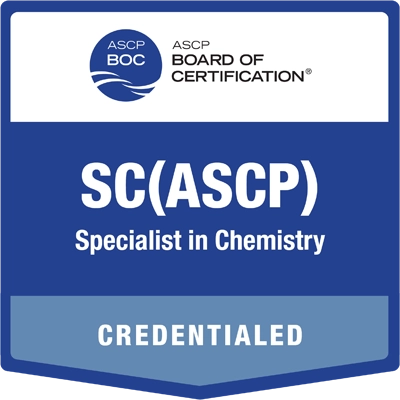 | 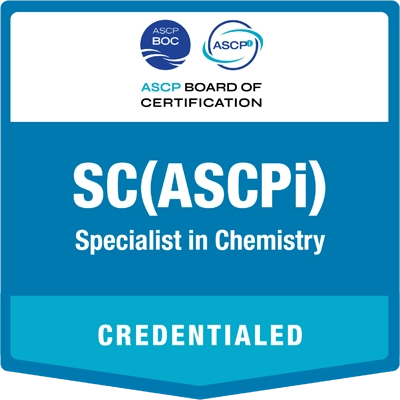 |
In early 2026, the ASCP BOC will launch digital badging through Credly, a trusted provider that increases the visibility of ASCP BOC credential holders by securely showcasing and sharing professional credentials. Learn more about digital badges.
